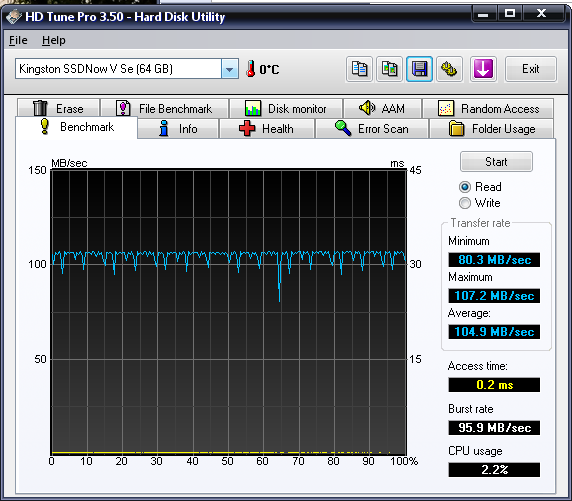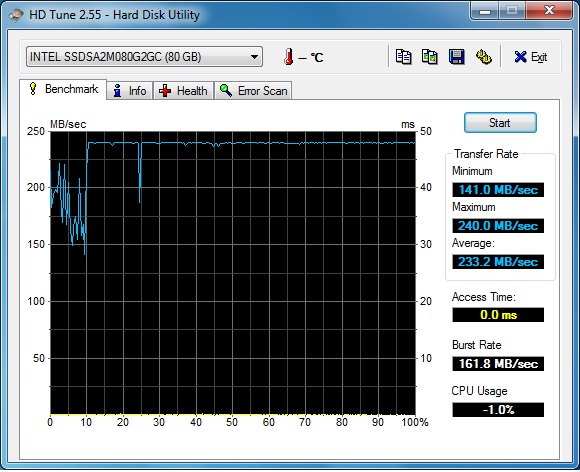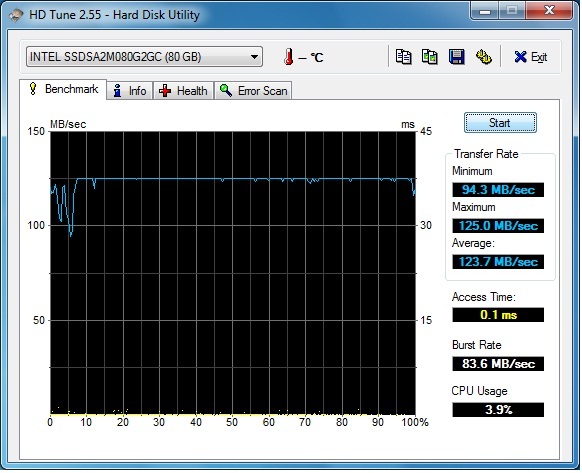Performance of Harddisks
- Thread starter Bart
- Start date
-
Hey - turns out IRC is out and something a little more modern has taken it's place... A little thing called Discord!
Join our community @ https://discord.gg/JuaSzXBZrk for a pick-up game, or just to rekindle with fellow community members.
You are using an out of date browser. It may not display this or other websites correctly.
You should upgrade or use an alternative browser.
You should upgrade or use an alternative browser.
The X25 is still the fastest SSD random access wise, but a few new SSD's comming to the market are faster, especially in sustained writes where the Intel SSD has always been a bit slow.
Controller company Sandforce have made a consumer level controller and it is being sold by OCZ as the Vertex 2 Pro: http://www.anandtech.com/storage/showdoc.aspx?i=3702
Theres also a couple of other SSD's that will beat the intel one, but they are targeted at the enterprise, so the price is probably a bit nuts there. With SSD's you get what you pay for, and the Sandforce one isn't going to be cheap.
Controller company Sandforce have made a consumer level controller and it is being sold by OCZ as the Vertex 2 Pro: http://www.anandtech.com/storage/showdoc.aspx?i=3702
Theres also a couple of other SSD's that will beat the intel one, but they are targeted at the enterprise, so the price is probably a bit nuts there. With SSD's you get what you pay for, and the Sandforce one isn't going to be cheap.
Bought a cheap and slow SSD (apporx. 66MB/s reading, 30ish MB writing) for my old HP laptop (guess i posted the screen alrdy here).
Still dont regret it that i removed my old travelstar 7200er screamer with a silent ssd. Also the system feels more fluint, even with such a cheap MLC one.
but i wont buy one for my desktops yet. i am waiting for new SATA3 ssds that will be even faster.
SATA2 (with theoretically 300mb/s) seems to become a bottleneck in the near future.
Still dont regret it that i removed my old travelstar 7200er screamer with a silent ssd. Also the system feels more fluint, even with such a cheap MLC one.
but i wont buy one for my desktops yet. i am waiting for new SATA3 ssds that will be even faster.
SATA2 (with theoretically 300mb/s) seems to become a bottleneck in the near future.
The X25 is still the fastest SSD random access wise, but a few new SSD's comming to the market are faster, especially in sustained writes where the Intel SSD has always been a bit slow.
Controller company Sandforce have made a consumer level controller and it is being sold by OCZ as the Vertex 2 Pro: http://www.anandtech.com/storage/showdoc.aspx?i=3702
Theres also a couple of other SSD's that will beat the intel one, but they are targeted at the enterprise, so the price is probably a bit nuts there. With SSD's you get what you pay for, and the Sandforce one isn't going to be cheap.
That was an interesting read.. most of it went over my head though

I guess it's still early days, and the Intel SSDs aren't likely to be ubber cheap just because some newer tech comes along. Gotta be worth buying into an early adopters market late, right?
bought the Intel X-25 80GB G2 the other day. Ofc my first task was toi upgraded the firmware (TRIM!).
Overall a good drive. Although SATA3 is around the corner and will hopefully increase SSDs speeds further.
NEvertheless this drive is worth every cent of the price (in my case 190euros). Too bad the prices are pretty stable the last months.
No matter what you say, but a decent SSD is the best upgrade you can do for your PC today.
Overall a good drive. Although SATA3 is around the corner and will hopefully increase SSDs speeds further.
NEvertheless this drive is worth every cent of the price (in my case 190euros). Too bad the prices are pretty stable the last months.
No matter what you say, but a decent SSD is the best upgrade you can do for your PC today.
Attachments
Last edited:
About lifetime of SSDs:
Read several times that Intel G2 SSD (Postville) has flash cells that can be overwritten over 10.000 times.
So this means: 10.000 x 80GB = 800.000 GB = ~ 800TB.
Conclusion: after 800TB is written on the device, it may get damaged.
Now lets play with this number:
So the SSD device wears out when you write...
...2TB every day for one year (800TB / 365 = ~2.2 TB/day)
...200GB every day for 10 years
...20GB every day for 100 years.
ofc these are theoretical calculations, but it shows that life expectancy aint really a problem on new SSDs.
oh btw, the 160GB version even double the numbers.
Lets hear what Intel (marketing manager ) has to say about this:
) has to say about this:
Read several times that Intel G2 SSD (Postville) has flash cells that can be overwritten over 10.000 times.
So this means: 10.000 x 80GB = 800.000 GB = ~ 800TB.
Conclusion: after 800TB is written on the device, it may get damaged.
Now lets play with this number:
So the SSD device wears out when you write...
...2TB every day for one year (800TB / 365 = ~2.2 TB/day)
...200GB every day for 10 years
...20GB every day for 100 years.
ofc these are theoretical calculations, but it shows that life expectancy aint really a problem on new SSDs.
oh btw, the 160GB version even double the numbers.

Lets hear what Intel (marketing manager
 ) has to say about this:
) has to say about this:Winslow told SST that Intel was able to achieve an MLC SSD device with high performance and long life. "We can provide at least a five-year useful life in a consumer notebook and that specification far exceeds the user model that we're benchmarking against," he said. "We've never seen a user write more than 20GB/day every day for five years. Our MLC SSD can allow a user to write 100GB/day every day for five years without wearing out the drive, so we've been able to establish that our SSDs -- whether SLC or MLC -- far exceed the reliability required by the usage models of the end applications."
90% of the laptops i've ever repaired at work needed new hard disks to get them back to life or full performance. The others have had damaged screens or broken power connectors.
I don't think math can factor in the any durability improvements SSD have over normal hard drives.
On another note, I'm certainly noticing the difference with the SSD. I've got 2 identical machines, 1 at work and 1 at home and the SSD does make stuff seem nice and responsive. Windows 7's remapping of the Documents and Libraries folders really helps to easily keep things organised, so I got my downloads and big stuff on a 1TB sata and Windows and smaller documents on my SSD.
88.6GB free of 149GB for my SSD
339GB free of 931 of my data drive.
Nice and easy
I don't think math can factor in the any durability improvements SSD have over normal hard drives.
On another note, I'm certainly noticing the difference with the SSD. I've got 2 identical machines, 1 at work and 1 at home and the SSD does make stuff seem nice and responsive. Windows 7's remapping of the Documents and Libraries folders really helps to easily keep things organised, so I got my downloads and big stuff on a 1TB sata and Windows and smaller documents on my SSD.
88.6GB free of 149GB for my SSD
339GB free of 931 of my data drive.
Nice and easy

SSDs are using normal HDD filesystems.
And why shouldnt they? SSD controllers in modern devices take care of the ominous wear level and uses different cells so every cell will be worn out nearly the same.
But you are right at some point. Normally temp files, and swap file (fix!!) should be placed on another HDD so the write cycles are reduced.
Also windows is quite stupid and uses SSD as they are normal HDDs with sectors. So that's why the alignment for SSDs is so important.
But it's not necessarily needed after good devices has a great GC, A TRIM function and a long life.
And why shouldnt they? SSD controllers in modern devices take care of the ominous wear level and uses different cells so every cell will be worn out nearly the same.
But you are right at some point. Normally temp files, and swap file (fix!!) should be placed on another HDD so the write cycles are reduced.
Also windows is quite stupid and uses SSD as they are normal HDDs with sectors. So that's why the alignment for SSDs is so important.
But it's not necessarily needed after good devices has a great GC, A TRIM function and a long life.
Last edited:
I don't give a shit about the wear and tear  It's just more responsive, and that's always a nice thing. 3 year warranty so the moneys good for that length of time at least.
It's just more responsive, and that's always a nice thing. 3 year warranty so the moneys good for that length of time at least.
Some people spend this amount of just their graphics cards these days! My 260 GTX has become the weakest part of the system according to the Winblows score:

 It's just more responsive, and that's always a nice thing. 3 year warranty so the moneys good for that length of time at least.
It's just more responsive, and that's always a nice thing. 3 year warranty so the moneys good for that length of time at least. Some people spend this amount of just their graphics cards these days! My 260 GTX has become the weakest part of the system according to the Winblows score:






